Plumbers and Penguins, Radio 4, Monday<br/>Woman's World, Radio 4, All Week
There's no people like snow people. They smile at -40C

Your support helps us to tell the story
From reproductive rights to climate change to Big Tech, The Independent is on the ground when the story is developing. Whether it's investigating the financials of Elon Musk's pro-Trump PAC or producing our latest documentary, 'The A Word', which shines a light on the American women fighting for reproductive rights, we know how important it is to parse out the facts from the messaging.
At such a critical moment in US history, we need reporters on the ground. Your donation allows us to keep sending journalists to speak to both sides of the story.
The Independent is trusted by Americans across the entire political spectrum. And unlike many other quality news outlets, we choose not to lock Americans out of our reporting and analysis with paywalls. We believe quality journalism should be available to everyone, paid for by those who can afford it.
Your support makes all the difference.The first permanent research base on Antarctica was established in 1956, since when it's had a permanent floating population of scientists.
But just as you and I need our cars serviced, our boilers maintained and our plumbing seen to – not to mention our bodies kept in good repair – so do they, and in 2009 the British Antarctic Survey recruited 43 plumbers, carpenters, mechanics, electricians and doctors to spend 18 months providing back-up for the boffins. In Plumbers and Penguins, Chris Eldon Lee followed their progress in a super documentary.
It was a vibrant and vivid depiction of life at the end of the world. Tony, a sparks from Luton, was loving the experience, except for the wind: "It's relentless, it's bitter, it's harsh – and it usually has bits in it that take off your skin. And it keeps blowing me over."
The programme focused mainly on Mark Green, a Bristol plumber, and Claire Lehman, a newly qualified GP who was going to be one of only three women there over the winter (when an entire continent is manned by a skeleton staff). It followed them from the beginning – "Maybe see about establishing the first WI in Antarctica," Lehman said. "We're definitely going to do lots of cake-baking" – through to the end of their tours of duty: "Addictive," said Mark. "I will most certainly be back in the future."
At one point in the year, the sun peeps above the horizon for 10 or 15 minutes, and Mark, who hadn't seen it for three-and-a-half months, was looking forward to its cameo at Halley Bay research centre. "To celebrate we're going to finish early, have a barbecue and become sun-worshippers," he said. "It's up to minus 40 again here."
Over at Rothera Research Base, meanwhile, the temperature was up to 3C: "We say we're the real Antarctic and they're in the banana belt," chuckled Mark. And where did the penguins come in? Well, apparently they're extremely personable, slightly nosy and will happily follow humans round. "Whenever you're having a glum day they'll certainly cheer you up," said Claire.
While Claire was thriving in a mostly male set-up, in the daily 15-minute episodes of Woman's World, Chris Ledgard explored some examples of male entryism in distaff-heavy environments. On Wednesday, he spoke to husband and wife Andy and Mandy, both Bristol midwives. Andy admitted that it seems an odd job for a bloke, though I must say I can't see the problem (a bloke writes), especially given the prevalence of male gynaecologists and obstetricians. Only rarely does anyone object, he said, usually on cultural grounds, but even Andy's female colleagues, who clearly love him dearly, think it's all a bit strange.
A French intellectual was wheeled on to fulminate against male midwives, complaining about the relentless "masculinisation of the childcare environment". But for Andy and Mandy, a man on the job avoids potential female pitfalls: if women midwives have had good experiences giving birth themselves, they sometimes take an "I was OK – just get on with it" attitude, while bad experiences can make them anxious.
Andy and Mandy have two children, and the second birth was a complicated one – which provoked jitters among their on-duty colleagues, as Andy recalled: "Just imagine – 'We've got Andy and Mandy in Room 9' – we caused a few grey hairs that evening."
Join our commenting forum
Join thought-provoking conversations, follow other Independent readers and see their replies
Comments